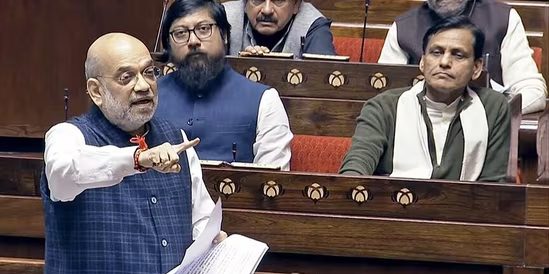Union Home and Cooperation Minister Amit Shah, addressing the Rajya Sabha, provided updates on several significant initiatives aimed at strengthening cooperative societies, enhancing rural livelihoods, and improving access to essential services.
Shah announced that 286 Primary Agricultural Credit Societies (PACS) from 25 States and Union Territories have applied online to establish retail petrol and diesel outlets in collaboration with Oil Marketing Companies (OMCs). Among these, 109 PACS from four states have moved forward, with 45 already receiving Letters of Intent (LOIs).
“This initiative strengthens PACS by creating additional revenue streams and enhancing their financial sustainability,” Shah stated. He added that the move generates employment for rural youth and ensures easier access to fuel for agricultural and transportation needs, promoting local economic growth while reducing reliance on urban centers for such services.
On NCDC, Shah said it has disbursed ?145.81 crore in financial assistance to dairy cooperatives across the country under the Dairy Sahakar Yojana. However, Shah noted that Haryana has not received any funds as no eligible proposals were submitted. The Dairy Sahakar Yojana is demand-driven and aims to provide financial support for infrastructure and business requirements of dairy cooperatives.
Shah also mentioned the now-discontinued Integrated Cooperative Development Project (ICDP) scheme, which ceased new fund allocations after April 1, 2021. Despite this, ?483.09 lakh was disbursed over the last three years to states such as Uttar Pradesh, Tamil Nadu, Bihar, and Kerala, from previously sanctioned funds. Uttar Pradesh received the highest amount at ?100.25 lakh, followed by Tamil Nadu with ?52.91 lakh.
The Ayushman Sahakar Scheme, aligned with the National Health Policy 2017, was highlighted as another transformative initiative by NCDC. The scheme aims to expand healthcare services through cooperatives, focusing on traditional AYUSH practices like Ayurveda, Yoga, Unani, Siddha, and Homoeopathy. It also supports digital healthcare initiatives under the National Digital Health Mission and enables cooperatives to offer services such as health education and insurance. “
In a significant step towards rural digital empowerment, Shah informed that PACS are being equipped to function as Common Service Centres (CSCs). This is facilitated through an MoU between the Ministry of Cooperation, Ministry of Electronics & IT, NABARD, and CSC e-Governance Services India Limited.
As of November 21, 2024, 40,214 PACS have started delivering over 300 e-governance services, including banking, insurance, agriculture, healthcare, and various government-to-citizen (G2C) services. By acting as nodal centers for these services, PACS are bridging the rural-urban divide, enabling financial inclusion and improving digital literacy among rural citizens. Shah highlighted that training programs for PACS personnel are being organized to ensure effective delivery of CSC services.
“This transformation positions PACS as key enablers of citizen-centric services at the Panchayat and village level,” he noted. The initiatives outlined by Shah underscore the government’s commitment to leveraging cooperatives for socio-economic development. From fuel retailing and dairy infrastructure to healthcare and digital governance, these measures aim to uplift rural communities, create jobs, and promote holistic development.














































